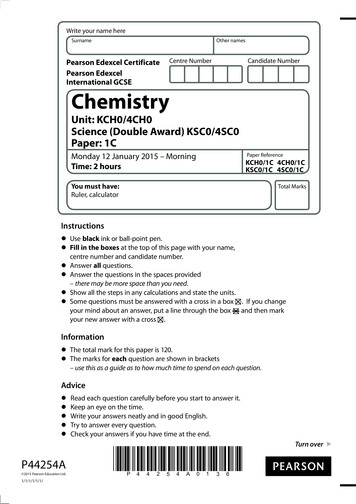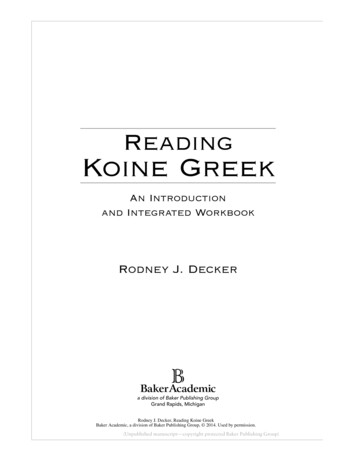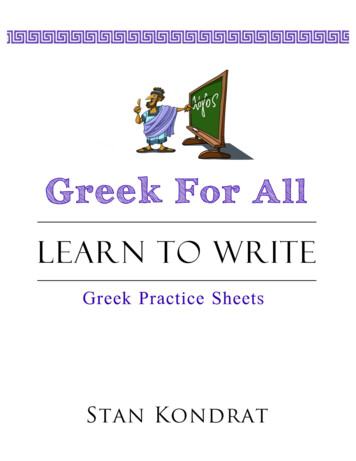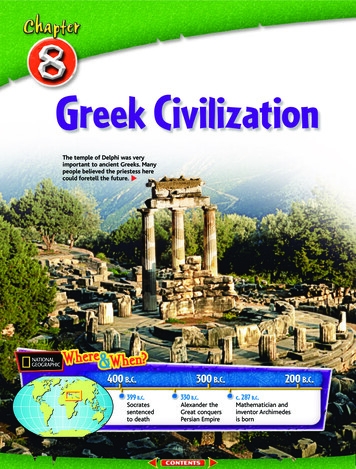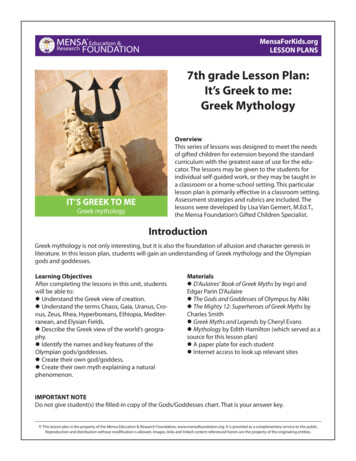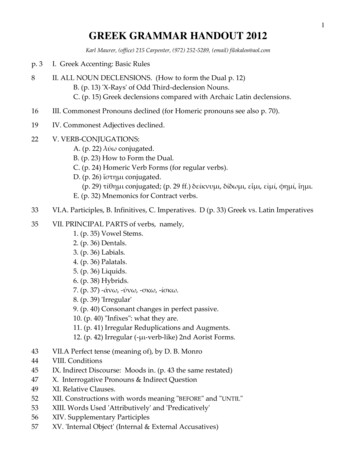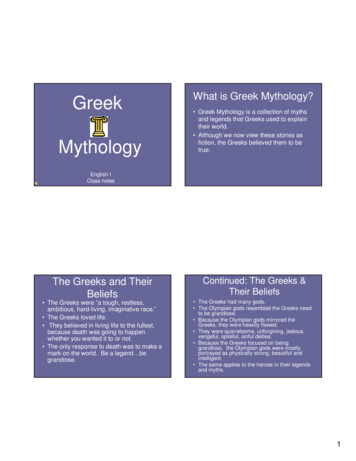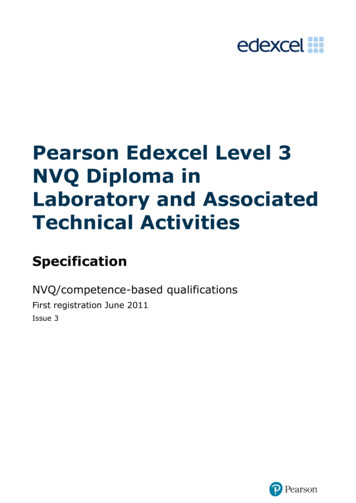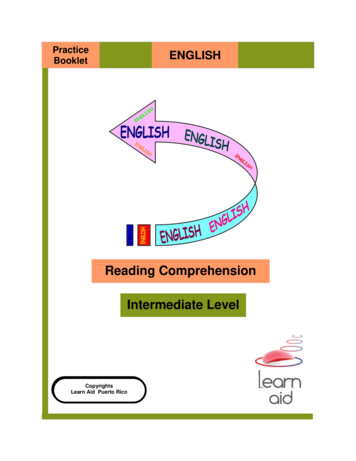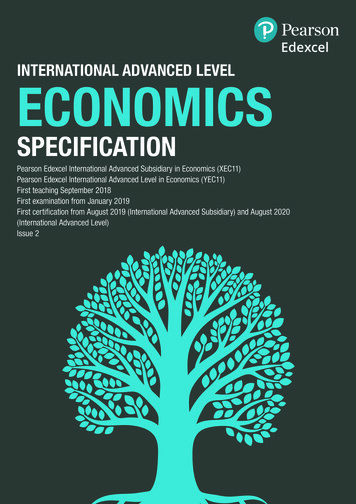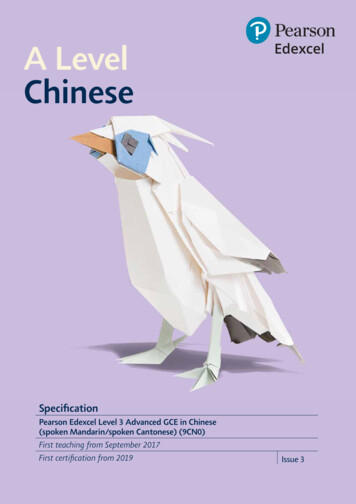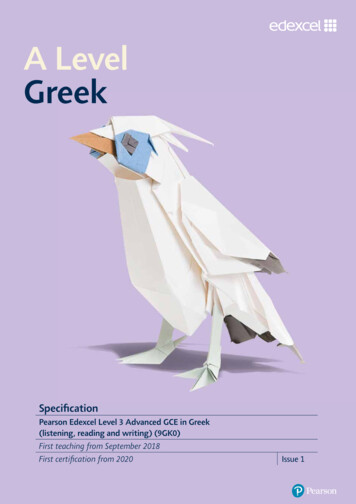
Transcription
A LevelGreekSpecificationPearson Edexcel Level 3 Advanced GCE in Greek(listening, reading and writing) (9GK0)First teaching from September 2018First certification from 2020Issue 1
Contents1Introduction2Why choose the Edexcel Level 3 Advanced GCE in Greek?2Supporting you in planning and implementing this qualification3Qualification at a glance427Subject content and assessment informationThemes, sub-themes and research subjects8Paper 1: Translation into English, reading comprehension and writing (researchquestion) in Greek10Paper 2: Translation into Greek and written response to works21Paper 3: Listening, reading and writing in Greek29Assessment Objectives35336Administration and general informationEntries36Access arrangements, reasonable adjustments, special consideration andmalpractice36Student recruitment and progression39Appendix 1: Prescribed literary texts and films43Appendix 2: Grammar list45Appendix 3: The context for the development of this qualification48Appendix 4: Transferable skills50Appendix 5: Level 3 Extended Project qualification51Appendix 6: Codes53
1 IntroductionWhy choose the Edexcel Level 3 Advanced GCEin Greek?We believe languages should appeal to all students. Our new Edexcel Level 3 Advanced GCEin Greek (listening, reading and writing) has been developed to inspire all students to havean appreciation of the language, literature, film and culture of Greece and Cyprus.We’ve listened to feedback from the languages community – subject associations, academicsand advisors, together with teachers and students – and have designed a motivating courseof study that will enable your students to develop advanced level knowledge andunderstanding of the Greek language, the culture of Greece and Cyprus, as well as practicaland valuable language and transferable study skills. This specification will help to preparestudents for higher education and enhance their employability profile.Inspiring and engaging themes – our qualification features familiar and popular themes,as well as some new content that provides clear links to some of the most fundamental andinteresting aspects of the culture of Greece and Cyprus.Popular literary texts and films – we offer a choice of literary texts and films that includescontemporary and more classic titles.Rewards creativity – our assessments place an emphasis on communication and grammar,as well as providing plenty of opportunities for students to apply their knowledgeindependently and creatively. Clear mark schemes encourage students to develop ideas, uselanguage to persuade and analyse, and give critical responses in their writing.Clear and coherent structure – our qualification has a straightforward structure with fourengaging themes: Αλλαγές στην ελληνική κοινωνία; Τέχνη και πνευματικός πολιτισμός στηνΕλλάδα; Όψεις της Κύπρου; Νέες εξελίξεις στο πολιτικό και οικονομικό πεδίο.The four themes are studied alongside two works (either two literary texts or one literarytext and one film) and are assessed through three externally-examined papers.Manageable content – we have worked closely with teachers and students to ensure thatour content is manageable and appropriate so that you and your students can be confidentthat you have enough time to cover what you need to at the appropriate depth.Continuous progression – our content builds on the understanding developed atKey Stage 4 and gives students the opportunity to learn and apply important transferableskills in critical thinking and analysis, enabling them to make a smooth transition to the nextlevel of study. However, students do not need to have studied GCSE Greek to follow thiscourse.2Pearson Edexcel Level 3 Advanced GCE in Greek (listening, reading and writing) – Specification –Issue 1 – January 2018 Pearson Education Limited 2018
Supporting you in planning and implementing thisqualificationOur Getting Started Guide, available on our website, gives you an overview of the newA Level qualification to help you get to grips with the changes to content and assessmentand to help you understand what these changes mean for you and your students.Teaching and learningThere will be lots of free teaching and learning support to help you deliver the newqualification, including: support with teaching literature and film support for the independent research.ResultsPlusResultsPlus provides the most detailed analysis available of your students’ examperformance. It can help you identify the topics and skills where further learning wouldbenefit your students.Get help and supportOur subject advisor service, led by Alistair Drewery, and our online community will ensurethat you receive help and guidance from us, and that you can share ideas and informationwith other teachers. You can sign up to receive e-newsletters to keep up to date withqualification updates and product and service news.Learn more at qualifications.pearson.comPearson Edexcel Level 3 Advanced GCE in Greek (listening, reading and writing) – Specification –Issue 1 – January 2018 Pearson Education Limited 20183
Qualification at a glanceContent and assessment overviewThe Pearson Edexcel Level 3 Advanced GCE in Greek (listening, reading and writing) consistsof three externally-examined papers that assess listening, reading and writing skills. Theseassessments will be set and marked by Pearson.Students must complete all assessments in May/June in any single year.Paper 1: Translation into English, reading comprehension and writing (researchquestion) in Greek (*Paper code: 9GK0/01)Written examination: 2 hours 30 minutes40% of the qualification80 marksContent overviewSection A draws on vocabulary and structures from any one of the sub-themes within thefour themes listed on pages 8–9.Section B draws on vocabulary and structures across all sub-themes from within the fourthemes listed on pages 8–9.Section C is based on independent research selected and carried out by the student. Theresearch must be based on one of the research subjects listed on pages 8–9. All aspects ofthe chosen research subject must be studied. Students use information from their researchfindings and from an unseen written stimulus to answer the question.Assessment overviewStudents are not permitted access to a dictionary during the examination or anydocumentation related to their researchThe examination is made up of:Section A: Translation into English (20 marks)An unseen passage to be translated from Greek to English.Section B: Reading (20 marks)A reading assessment based on a variety of text types and genres. Students must respondto a series of comprehension questions.Section C: Writing (research question) (40 marks)A reading and writing question based on an aspect of the student’s chosen research subject.Students read a text and then answer a question, incorporating information and ideas fromboth the text and their research findings.4Pearson Edexcel Level 3 Advanced GCE in Greek (listening, reading and writing) – Specification –Issue 1 – January 2018 Pearson Education Limited 2018
Paper 2: Translation into Greek and written response to works(*Paper code: 9GK0/02)Written examination: 2 hours and 40 minutes30% of the qualification110 marksContent overviewSection A draws on vocabulary and structures from any one of the sub-themes within thefour themes listed on pages 8–9.Sections B and C draw on the study of two discrete Greek works: either two literary texts orone literary text and one film. The works must be taken from the list provided inAppendix 1: Prescribed literary texts and films. The literary texts listed include a range ofnovels, poems and short stories. All of the films are feature length.Assessment overviewThis paper includes a translation exercise and two essays on either two literary texts or oneliterary text and one film (students must not answer questions on two films).During the examination, students are not permitted access to a dictionary or anydocumentation relating to the works.Section A: Translation into Greek (20 marks)Students translate an unseen passage from English into Greek.Section B: Written response to works (literary texts) (45 marks)Students must write an extended response on either one or two of the literary texts listed inAppendix 1: Prescribed literary texts and films.Students select one question from a choice of two for each of their chosen literary text(s). Ifa student answers questions on two literary texts, then they do not complete Section C.Section C: Written response to works (films) (45 marks)Students who answer only one question from a literary text in the Section B must write anextended response on one of the films listed in Appendix 1: Prescribed literary texts andfilms.Students select one question from a choice of two for their chosen film.Pearson Edexcel Level 3 Advanced GCE in Greek (listening, reading and writing) – Specification –Issue 1 – January 2018 Pearson Education Limited 20185
Paper 3: Listening, reading and writing in Greek(*Paper code: 9GK0/03)Written examination: 2 hours and 15 minutes30% of the qualification60 marksContent overviewSection A draws on vocabulary and structures across all sub-themes within the four themeslisted on pages 8–9.The Section B draws on vocabulary and structures from any one of the sub-themes withinthe four themes listed on pages 8–9. There is one unseen listening source and one unseenwritten source that students must respond to.Assessment overviewThis paper includes a listening comprehension and a question that assesses listening, readingand writing skills together.Students are not permitted access to a dictionary during the examination.Section A: Listening comprehension (30 marks)A listening assessment based on a recording that features male and female Greek speakers.Students will respond to comprehension questions based on a variety of contexts andsources.The listening audio files for the sample assessment materials are available on the PearsonEdexcel website.Section B: Listening, reading and writing question (30 marks)Students summarise a listening source and a text that are based on the same sub-theme.Students then evaluate the points of view in both sources, stating which views they agreewith and why.*See Appendix 6: Codes for a description of this code and all other codes relevant to thisqualification.6Pearson Edexcel Level 3 Advanced GCE in Greek (listening, reading and writing) – Specification –Issue 1 – January 2018 Pearson Education Limited 2018
2 Subject content and assessmentinformationQualification aims and objectivesThe aims and objectives of this qualification are to enable students to: enhance their linguistic skills and promote and develop their capacity for critical thinkingon the basis of their knowledge and understanding of the language, culture and society ofGreece and Cyprus develop control of the language system to convey meaning, using written skills, includingan extended range of vocabulary, for both practical and intellectual purposes asincreasingly confident, accurate and independent users of Greek develop their ability to understand language in spoken and written form and to interacteffectively with users of Greek in writing develop language skills and strategies, including comprehension strategies such as usingcontextual clues and cues, and communication strategies to build fluency and confidencein writing develop speaking skills as part of their courses of study, although there will be noassessment of those skills engage critically with intellectually stimulating texts, films and other materials in theoriginal language, developing an appreciation of sophisticated and creative uses of Greekand understanding them within their cultural and social context develop knowledge about matters central to the society and culture, past and present, ofGreece and Cyprus translate texts from English into Greek, and from Greek into English foster their ability to learn other languages equip themselves with transferable skills such as autonomy, resourcefulness, creativity,critical thinking, and linguistic, cultural and cognitive flexibility that will enable them toproceed to further study or employment develop their capacity for critical and analytical thinking through the language of study develop as independent researchers through the language of study.Pearson Edexcel Level 3 Advanced GCE in Greek (listening, reading and writing) – Specification –Issue 1 – January 2018 Pearson Education Limited 20187
Themes, sub-themes and research subjectsPapers 1, 2 and 3 will be based on content from the following four themes.The four themes address a range of content related to society past and present, as well asaspects of the political and artistic culture of Greece and Cyprus.Themes 1, 2 and 4 focus on aspects of the society, artistic culture, and politics of Greeceonly. Theme 3 focuses on society in Cyprus.Each theme is broken into two sub-themes and a research subject (highlighted in bold).Each sub-theme and research subject is divided into a series of aspects.Students are required to select only one research subject for Paper 1. For their research,students must cover all three aspects of the research subject. Teachers should considercultural sensitivities when giving guidance to students on selecting an appropriate researchsubject.Πρώτο Θέμα: Αλλαγές στην ελληνική κοινωνίαTheme 1 is set in the context of Greece only. This theme covers society past and present. Σχέσεις και Οικογένειαη εξέλιξη του μοντέλου της πυρηνικής οικογένειας, οι έμφυλοι ρόλοι, οι σχέσεις με τουςμεγαλύτερους και τους συνομήλικους Ο χώρος της εργασίαςοι εξελίξεις στον τομέα της απασχόλησης στην Ελλάδα, ανεργία, οι φοιτητές στην αγορά εργασίαςΕρευνητικό θέμα Η Παιδεία στην Ελλάδαεξελίξεις στο εκπαιδευτικό σύστημα, το γλωσσικό ζήτημα, αλλαγές στη διδακτέα ύληΔεύτερο Θέμα: Τέχνη και πνευματικός πολιτισμός στην ΕλλάδαTheme 2 is set in the context of Greece only. This theme covers artistic culture past andpresent. Σύγχρονος πνευματικός πολιτισμός και μέσα επικοινωνίαςδημοφιλή μέσα επικοινωνίας, κινηματογράφος και τηλεόραση, η επιρροή της τεχνολογίας στιςκοινωνικές πρακτικές και στον πνευματικό πολιτισμό Παράδοση, ήθη και έθιματοπικές γιορτές, παραδοσιακοί τρόποι αναψυχής και ψυχαγωγίας, απόψεις σχετικά με τηνπαράδοση και τα πιστεύωΕρευνητικό θέμα Το ρεμπέτικοτο ιστορικό πλαίσιο, θεματολογία και πολιτιστικά συμφραζόμενα, διάσημοι καλλιτέχνες τουρεμπέτικου8Pearson Edexcel Level 3 Advanced GCE in Greek (listening, reading and writing) – Specification –Issue 1 – January 2018 Pearson Education Limited 2018
Τρίτο θέμα: Όψεις της ΚύπρουTheme 3 is set in the context of Cyprus only. This theme covers society past and present. Ανθρωπογεωγραφίααλλαγές σχετικά με το βιοτικό επίπεδο και την ποιότητα ζωής, διαχωρισμός μεταξύ αστικούκαι αγροτικού περιβάλλοντος, τουρισμός Φυσική γεωγραφίατο περιβάλλον, αλλαγές στις αντιλήψεις σχετικά με την προστασία του περιβάλλοντος,επιπτώσεις της βιομηχανοποίησης στην κοινωνία και στο περιβάλλονΕρευνητικό θέμα Ιστορία της Κύπρου 1974-1983Ιούλιος 1974, οι επιπτώσεις των γεγονότων του 1974 στην κοινωνία της Κύπρου, σημαντικέςπροσωπικότητες της περιόδουΤέταρτο θέμα: Νέες εξελίξεις στο πολιτικό και οικονομικό πεδίοTheme 4 is set in the context of Greece only. This theme covers political culture past andpresent. Η οικονομία από το 2009 και μετάοι αιτίες και οι επιπτώσεις της κρίσης, ο ρόλος της Ευρωπαϊκής Ένωσης, κοινωνικές διαμάχες καιαναταραχές Η πολιτική σκηνήτα κύρια πολιτικά κόμματα, τα πολιτικά τους προγράμματα και οι σημαντικές προσωπικότητες απότο 2009 και μετά, το δημοψήφισμα της 5ης Ιουλίου 2015Ερευνητικό θέμα Πρόσφυγες στην Ελλάδαπρόσφυγες στην Ελλάδα από το 2015 και μετά, η ένταξη των προσφύγων στην ελληνική κοινωνία, τοέργο των Μη Κυβερνητικών Οργανώσεων (ΜΚΟ)Pearson Edexcel Level 3 Advanced GCE in Greek (listening, reading and writing) – Specification –Issue 1 – January 2018 Pearson Education Limited 20189
Paper 1: Translation into English, readingcomprehension and writing (research question) inGreekContentStudents will be assessed on their ability to translate accurately from Greek into English,their understanding of written Greek from a variety of types of authentic texts, and theirknowledge and understanding of culture and society via research.Texts vary in length and include an extended passage. All written materials are culturallyrelevant to Greece and Cyprus and are drawn from the four themes (listed on pages 8–10).Students should be able to: translate from Greek into English understand main points and detail from written material infer meaning from complex written material assimilate and use information from written sources develop research skills, demonstrating the ability to initiate and conduct individualresearch using a range of authentic sources in Greek use information from research findings and an unseen stimulus to put forward anargument, draw conclusions and demonstrate knowledge and understanding of theresearch subject.Although speaking skills are not directly assessed in the qualification, students should beencouraged to develop their speaking skills in Greek during the course of study.Translation into EnglishThe content of the translation will be taken from any one of the sub-themes within the fourthemes.ReadingThe reading section will be made up of texts containing both factual and abstract content andwill be authentic or adapted from authentic sources. The texts will include contemporary,historical, literary, fiction and non-fiction sources, written for different purposes andaudiences.Writing (research question)This section comprises an unseen text based on the research subject and a question relatedto the text. Students must use their research findings, as well as information in the text, toanswer the question.10Pearson Edexcel Level 3 Advanced GCE in Greek (listening, reading and writing) – Specification –Issue 1 – January 2018 Pearson Education Limited 2018
Assessment information First assessment: May/June 2020. The total assessment time is 2 hours and 30 minutes. Recommended timings for eachsection are given below. The assessment is out of 80 marks. There are three sections in the paper. They cover the assessment of translation, reading,and writing skills in Greek, as well as knowledge and understanding of culture and society. Students must answer all questions in each Sections A and B and one question on theirchosen research subject in Section C. Students are not permitted access to a dictionary during the examination or anydocumentation related to their research. For Section A (translation into English), 20 minutes (recommended timing), 20 marks:o students are given one unseen text in Greek and must translate it into English. For Section B (reading), 45 minutes (recommended timing), 20 marks:o students respond to four questions based on the texts providedo questions are comprised of both multiple-choice questions and open-responsequestions. For Section C (writing), 1 hour and 25 minutes (recommended timing), 40 marks:o students read one unseen text in Greeko students respond to a statement based on the research subject; they must useinformation from the unseen text and their research findings in their responseo students are expected to critically analyse the statement and demonstrate knowledgeand understanding of the research subject. They do this by presenting ideas, argumentsand conclusions that are supported by relevant information, examples and referencesfrom their research findings and from the stimulus text. Students must use a range oflanguage accurately and focus on the question throughout their responseo students should write approximately 270–320 words in their answer. All questions in Sections B and C are set in Greek and must be answered in Greek.The recommended timings have been set to enable the student to complete each section insufficient time.Pearson Edexcel Level 3 Advanced GCE in Greek (listening, reading and writing) – Specification –Issue 1 – January 2018 Pearson Education Limited 201811
Guidance on the independent researchFor the purposes of the assessment, independent research means research carried outwithout the help or instruction of others, including teachers.The independent research must relate to the Greek-speaking cultural and/or social context.The student must base their research on all aspects of one of the prescribed researchsubjects listed on pages 8 and 9.The independent research must not relate to or make reference to one of the literary worksor films studied for Paper 2. The independent research must: allow students to gather evidence independently from at least two authentic sources in theassessed language. Authentic sources could include newspaper and magazine articles,online written sources, journals, literary texts, films, television, radio, online audio-visualmaterial and interviews. The types of evidence that show knowledge and understanding ofsociety and culture (and research) are outlined in information relating to indicative contenton page 15 enable the student to contextualise and evaluate their findings independently.The table below gives guidance on the process that could be followed.StageDescription1 Pre-independentresearch Teacher instruction on how to conduct research, for example theteacher gives advice on suitable resources and how to analyseinformation. Initial conversations with the teacher, explaining the content of theresearch subject as outlined in the specification. The teacher should consider cultural sensitivities when givingguidance to students on selecting an appropriate research subject.2 Independentresearch The student conducts research to find and select appropriatesources. The teacher monitors the research by giving general feedback. Students evaluate their findings and prepare for the assessment.It is recommended that students decide on which research subject they wish to research asearly as possible in the academic year. However, learning hours for the independent researchare not specified because the process of information collation and investigation areundertaken independently.12Pearson Edexcel Level 3 Advanced GCE in Greek (listening, reading and writing) – Specification –Issue 1 – January 2018 Pearson Education Limited 2018
Teachers can: give guidance on developing research skills (including methodology and analytical tools) give guidance on the content of the research subjects as outlined in the specification comment on the availability of resources and time constraints advise and direct students to the Assessment Objectives.Teachers must: explain what ‘independence’ means (see definition in Guidance on the independentresearch on page 12) confirm that the student’s research meets all of the aspects of the research subject andhas the potential to meet the requirements of the assessment criteria ensure that students do not intend to use any of the literary works or films that they havestudied for Paper 2 in their research monitor the different research subjects being undertaken in a centre to ensure thatindependence is being maintained. If more than one student chooses the same researchsubject, the teacher must ensure that each student is working independently.Teachers must not: teach the content of the research subjects to students and provide sources.Students must: initiate and conduct their own research, and develop their research skills wheninvestigating their research subject.If malpractice is found to have taken place, a penalty may be applied, dependent on thecircumstances and severity of the malpractice.For full details on malpractice, please see the section entitled Malpractice and the JCQdocument Suspected Malpractice in Examinations and Assessments 2016–17.Synoptic assessmentSynoptic assessment requires students to work across different parts of a qualification and toshow their accumulated knowledge and understanding of a topic or subject area.Synoptic assessment enables students to show their ability to combine their skills, knowledgeand understanding with breadth and depth of the subject.This paper assesses synopticity.Sample assessment materialsA sample paper and marking criteria (including guidance on how these criteria are applied)for this paper can be found in the Pearson Edexcel Level 3 Advanced GCE in Greek (listening,reading and writing) Sample Assessment Materials (SAMs) document.Marking guidanceMarking guidance has been written to accompany the SAMs and is included with the SAMsbooklet. Please note that this guidance is for the use of the Pearson-appointed externalexaminers. It is printed for reference in the specification to aid understanding of how theassessment criteria will be applied.Pearson Edexcel Level 3 Advanced GCE in Greek (listening, reading and writing) – Specification –Issue 1 – January 2018 Pearson Education Limited 201813
Marking guidance for Paper 1: Translation into English,reading comprehension and writing (research question) inGreekThis marking guidance is for the use of Pearson-appointed external examiners. The guidancehas been included for teacher reference to aid understanding of how the assessment criteriawill be applied.Section A – Question 1 (translation into English)This question is marked using a points-based mark scheme in which 1 mark is given for eachcorrect individual section of language. Please see the Pearson Edexcel Level 3 Advanced GCEin Greek (listening, reading and writing) Sample Assessment Materials (SAMs) document foran example of how the translation will be marked.Section B – Questions 2 to 5 (reading comprehension)A sample paper and mark scheme for this section can be found in the Pearson EdexcelLevel 3 Advanced GCE in Greek (listening, reading and writing) Sample Assessment Materials(SAMs) document.Section C – Writing (research question)There are three levels-based mark grids to be applied to this question. These are: knowledge and understanding of society and culture (via research) (AO4) understand and respond to written language in writing (AO2) accuracy and range of language (AO3).General guidance on using levels-based mark schemesStep 1: Decide on a marking band First of all, the examiner will consider the answer as a whole and then decide whichdescriptors most closely match the answer and place it in that band. The descriptors foreach band indicate the different features that will be seen in the student’s answer for thatband. When assigning a level, the examiner will look at the overall quality of the answer and notfocus disproportionately on small and specific parts of the answer where the student hasnot performed quite as well as the rest. If the answer covers different aspects of differentbands of the mark scheme, the examiner will use a ‘best fit’ approach for defining thelevel. They will then use the variability of the response to help decide the mark within thelevel. For example, if the response is predominantly band 13–16 with a small amount ofband 17–20 material, it would be placed in band 13–16 but be awarded a mark near thetop of the band because of the band 17–20 content.Step 2: Decide on a mark Once the examiner has decided on a band they will need to decide on a mark within theband. They will decide on the mark to award based on the quality of the answer; they will awarda mark towards the top or bottom of that band, depending on how the student hasevidenced each of the descriptor bullet points. The examiner will modify the mark based on how securely the trait descriptors are met atthat band. They will need to go back through the answer as they apply the mark scheme to clarifypoints and assure themselves that the band and the mark are appropriate.14Pearson Edexcel Level 3 Advanced GCE in Greek (listening, reading and writing) – Specification –Issue 1 – January 2018 Pearson Education Limited 2018
Knowledge and understanding of society and culture(AO4 – 20 marks) This mark grid assesses the content of the student’s answer in relation to the knowledgeand understanding of culture and society they have demonstrated, based on theirresearch. It also assesses their ability to critically analyse by sustaining a line of argumentand drawing conclusions about aspects of culture and society, based on the questionrelated to the research subject.Understand and respond to written language (AO2 – 10 marks) This grid assesses students’ understanding of the unseen text through their ability to userelevant information from it to contribute to the ideas, arguments and conclusionspresented on society and culture.The two mark grids for AO4 and AO2 are presented side by side. This is because of theconnection between the information that students are producing based on knowledge andunderstanding of society and culture, and the information that they are using from theunseen text to contribute to this.Indicative content When deciding how to reward the answer for content, examiners will consult both of thesemark grids as well as the indicative content associated with each question, this can befound in the document Pearson Edexcel Level 3 Advanced GCE in Greek (listening, readingand writing) Sample Assessment Materials (SAMs). Indicative content contains points thatstudents are likely to use to construct their answer. It is possible for an answer to beconstructed without mentioning some or all of these points, as long as students providealternative responses that fulfil the requirements of the question. The indicative content shows that students are expected to place more emphasis onknowledge and understanding of society and culture (AO4) than on the text (understandand respond in writing to written language – AO2). This emphasis is reflected in thegreater number of marks available for AO4 (20 marks) than for AO2 (10 marks). Students can demonstrate their knowledge and understanding of society and culture(researc
Key Stage 4 and gives students the opportunity to learn and apply important transferable skills in critical thinking and analysis, enabling them to make a smooth transition to the next level of study. However, students do not need to have s

